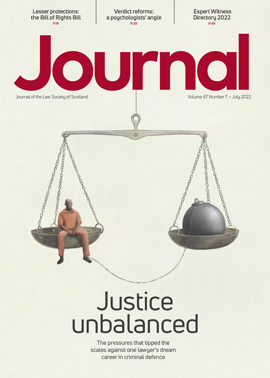The power of emotion in law

As lawyers, it is my experience that we often conform to standards of perceived normative professionalism. Personality is parked; it is seen as mutually exclusive with the traits of a “traditional lawyer” – whatever one of those is.
As Emeritus Professor Susan A Bandes of DePaul University College of Law put it in 2016: “The legal system has long been inhospitable terrain for the study of emotion. The standard model of legal education treats law as a science, legal reasoning as a purely deductive process (Langdell 1871), and emotion as the enemy of reason. In this model, emotions are individual, arbitrary, unanalyzable, and ultimately a threat to the proper functioning of the legal system. They are, in the words of one prominent legal scholar, ‘inconsistent with the very norms that govern and legitimate the judicial power’ (Fiss 1990). This attitude is still pervasive in law.”
Let me elaborate. My hypothesis is that positivity, enthusiasm and happiness are underrated by law firms. Scottish law firms choosing an antiquated attitude towards emotion are at odds with many of the laws we interpret.
We deal regularly with concepts of trust, confidence, reasonableness, injury to feelings, suffering – all intangibles which register on an emotional scale. When law firms hire or reward based on unsupported or mistaken notions of how in control of emotions a person might appear, they are missing a trick.
Take a moment to think about how emotion translates into some of the key areas where lawyers seek to excel.
Studying law
The belief that emotion plays no good role in reasoning has also had a powerful, and often pernicious, effect on the education of law students. Speaking to law students through the Law Society of Scotland Racial Inclusion Group, through events with the Scottish Discrimination Law Association and SYLA and other firm/university gatherings, I could not help but feel their real personalities had to be unveiled over time. Individuals harboured a genuine reluctance to draw attention to themselves with any overt display of emotion, no matter how positive.
Winning new clients
The traditional assumption that those trained in the law should not traffic in emotion has led to large gaps in our knowledge about those who engage us. Our clients are increasingly our audience. They scan our content, our videos, our websites and our demeanours, not to award prizes for brilliant legal rationale and understanding, but for our more human traits. The ability to know, like and trust has long been seen as the triumvirate for securing new client relationships across different sectors. As those relationships are cultivated over time, through shared experiences and social (as well as legal) interactions, liking and trust increase in the minds of both lawyers and those we proudly serve.
Building strong client relationships
Lawyering in general raises a host of other emotional issues. For example, client relationships may raise issues of loyalty, empathy, anger, frustration and sadness. Lawyers must address their clients’ hopes and fears and establish trust under difficult circumstances. They must also deal with their own emotions – but that does not mean hiding them.
Being yourself
During lockdown, a colleague and I attended a virtual funeral for a wonderful lady we had worked with as a client for many years. I cried hard that day and still miss her. I have also celebrated births, birthdays, nights out, charity events and weddings with clients. The ability to embrace empathy, sorrow or happiness is human. I encourage any reader – please do not feel you have to hide yourself or your human responses: they have truly awesome power.
The talented future of the Scottish legal profession would do well to be reassured that those holding the torch love to see them happy, positive and thriving. Those emotions enrich our offices and firm cultures. Increasingly, we seek out these individuals – people who will showcase their range of emotions and bring their true selves to work. Our clients love them, and so should we.
Perspectives
Features
Briefings
- Civil court: Issues on appeal
- Licensing: Minimum pricing – a genuine impact?
- Insolvency: How to admit joint creditor claims
- Tax: windfall and plastic packaging taxes raise stakes
- Immigration: Asylum system overhauled
- Scottish Solicitors' Discipline Tribunal: July 2022
- In-house: In with the stonework
- Property: Living with the Register of Overseas Entities
In practice
- OPG update: July 2022
- Public policy highlights: July 2022
- Gear up for the Scottish Legal Walks
- Disabled solicitor support group proposed
- Risk: Cybercrime – the hybrid worker prey
- Ask Ash: Piling it on
- TRS: time for a trusts trawl
- Know people, know business
- High street and hybrid
- Appreciation: Ian Leslie Shaw Balfour
- The Expert Witness Directory 2022
- Expert witness: case law update







